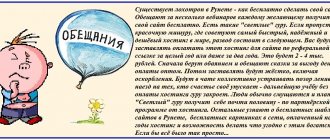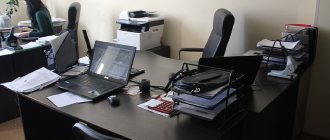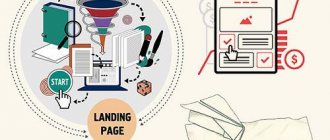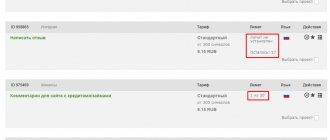Is it really possible to make money on Forex?
Everyone was once a beginner and asked similar questions - “is it really possible to make money on Forex?” Answer: “realistic, but you need to learn.” As practice has shown, traders are not born, but made. Don't be afraid to learn something new.
If it were impossible to make money on Forex, then all private traders would leave it. There are many examples of ordinary people becoming quite wealthy through successful trading.
It is possible to make money on Forex. Many traders confirm this.
Some people believe that “trading is a very simple activity.” Most likely, these people have never encountered financial speculation. Submitting a buy/sell order is certainly not difficult. This is done with a couple of taps on the keyboard or on your smartphone.
The whole difficulty lies in something completely different - determining what to buy, when to sell and at what price. To answer these questions, you will have to study both fundamental and technical analysis.
Which currency to choose to make money on exchange rate fluctuations
The value of any money changes over time. However, there are not so many options in which currency you can invest in to earn money:
- dollars;
- Euro;
- Swiss frank;
- British pound;
- cryptocurrencies.
Experts advise never to keep all your savings in one currency. It will be much more effective and reliable to assemble a financial portfolio from several stable and freely convertible monetary units. At the moment, it is recommended to choose at least three: dollars, euros and Chinese yuan. At the same time, it is important to constantly monitor the situation on the foreign exchange market in order to regulate the content of your portfolio.
How much can you earn on Forex?
If you can really make money on Forex, then the next question arises: “How much”? It would be wrong to answer this question in absolute terms, because... it all depends on the current deposit size. Earning $100 from a $1,000 deposit is not the same as $100 from a $10,000 deposit.
Forex brokers provide the opportunity to use incredible leverage (1 to 500). This means that if you have $100, you can trade 500 times that amount, or $50,000. Theoretically, you can try to take such a huge leverage, but the chances of losing all your funds with such risks are almost 100% (any price fluctuation of 0.2% not in your direction will completely destroy the deposit). You should only trade with more adequate leverage.
By playing with safer leverage (for example, 1 to 10), you can earn much more than by trading without leverage. This must be understood in the same way. The higher the risks, the higher the potential returns.
Trading with leverage is called “margin”.
In my opinion, it is better to trade either only with your own funds, or take leverage no more than 1 to 5. Traders feel more comfortable when they know that their risk is within acceptable limits. Margin trading is only suitable for experienced players.
I want to give exclusively sensible figures without embellishment and with a high degree of safety without losing your funds. So, by trading only your own funds, you can count on a return of 10-30% per annum. If you take leverage, say, 1 to 3, then you can count on 25-50% per annum.
Accordingly, if you put $100 into your account, then turning it into thousands of dollars in a year is a virtually impossible task. Any professional will tell you this. More precisely, it's just luck. You will have to take big risks, which can destroy your deposit in 1-2 unsuccessful transactions.
To earn big money you need a decent initial deposit.
What is important to know about inflation when making money on exchange rates
Inflation is one of the most important factors that must be taken into account when planning foreign exchange transactions. Without a clear understanding of what it is, you won’t be able to make money on exchange rates. A simple example: a year ago you bought 100 dollars, and now you sold them. Since the exchange rate has become more favorable, the transaction seems profitable. However, if you remember that the USA also has inflation, it turns out that you have lost about 5% of the original amount. And although technically you now own a large amount of the national currency, the rise of the dollar is actually a fall of the ruble, so the value of your capital remains approximately the same as a year ago.
Speculators enter into transactions on a different principle: they wait until the currency becomes cheaper, buy it, and then sell it when it rises. The key to earning money in this case is the increase in value. If we talk about Forex, there is an opportunity to make money both on increasing and decreasing prices.
If you really want to profitably invest your savings, it is better to purchase securities. The income from them, although small, is stable, and you definitely won’t lose your savings.
The main principle of Forex
The most important principle of Forex trading is to buy cheaper and sell more. You can buy and sell everything that is presented on the market:
- Currency pairs
- Stock indices
- Stock futures
- Cryptocurrencies
- Metals
The trader decides when to enter and when to exit the market, so the trading result depends entirely on his experience and a little luck.
In Forex, there is a “struggle” between market participants. According to legend, there are large players “market makers” who own 90% of all money on the exchange. In fact, the struggle between small traders is not among themselves, but only with them. The goal of large players is to swing the market from side to side, make false movements, cut stop losses, and lead traders astray. And the crowd falls for the tricks, sells low, buys high. Brokers and the “smart money” make money from all these frauds.
Forex patterns
Traders decide to open a position based on the results of technical, graphical, fundamental, wave, and candlestick analysis. The specifics of the work are related to the search for patterns in the graph. When similar situations are repeated, it is assumed that bidders will behave in an identical manner. It is on this basis that strategies are built.
Among the most well-known patterns are the following factors:
- price levels;
- candlestick configurations: reversal, trend continuation;
- graphic figures: triangles, “Double bottom”, “Head and shoulders”;
- wave structure of price movement according to Eliot's theory.
Patterns are identified by studying trading history on a price chart.
Finding patterns in the graph
Where to start: learning the basics of Forex trading
It is necessary to study the basics and principles of the exchange before starting trading. As I noted just above: you can only earn money by knowing and understanding what you are doing. Without strategy and trading knowledge, all trading will resemble a game of roulette, where there are chances of occasional success.
What books should I read? What should a novice trader learn? I advise you to read basic books on trading and the stock exchange. Also touch on some books on economics. All this will broaden your horizons and allow you to better understand the market.
There are many books on trading. There are plenty to choose from. Moreover, many of them describe different approaches and the more you know, the generally better. But don’t think that after reading all the books you will become a millionaire.
I recommend reading the following books:
- Technical analysis of futures markets: theory and practice (John Murphy)
- Technical analysis. The Complete Course (Jack Schweiger)
- Technical analysis from A to Z (Akelis Stephen)
- Stock Exchange Secrets (Linda Raschke)
- Technical Analysis (Michael N. Kahn)
- Intermarket Technical Analysis (John Murphy)
- Tic-tac-toe graphical analysis method (Thomas Dorsey)
- Small Trader's Encyclopedia (Eric L. Nyman)
- Trading Chaos (Bill Williams)
- Day Trading Tutorial (Lewis Borsellino)
Is it possible for a beginner to earn money without experience?
You can earn money, but it will be an extremely unstable income. It might just lead you and it will be the illusion that you are great and professional. Everywhere you need experience and Forex is no exception. Until you get the hang of your mistakes, you won’t become a professional.
How to play the Forex market from scratch - step-by-step instructions for successful trading
Let's move from the theoretical part to the practical part. This step-by-step trading technology will help novice traders earn their first money in a minimum amount of time and subsequently become Forex professionals.
Step 1. Master the theory of stock trading
There is no point in immediately practicing without knowing the basics if you are going to do something new. And the foreign exchange market is no exception.
Start reading books on the topic of exchanges, Forex, fundamental and technical analysis.
To get started, we recommend reading the following classic books on the topic, they will be especially relevant for beginners:
- Nassim Taleb - “Black Swan. Under the sign of unpredictability";
- Thomas Oberlechner - “Forex Market Psychology”;
- George Soros - "The Alchemy of Finance";
- Mark Douglas - "The Disciplined Trader".
Also on YouTube and more, you can find a huge amount of information on how to play Forex, as well as interviews with analysts and currency market practitioners.
Step 2. Select a Forex broker
Once you understand the theory, you will need to move on to the first purely practical step - choosing a Forex broker.
A broker is a company that allows you to trade in the market.
You can carry out all transactions on Forex only through a broker, since individuals cannot carry out trading operations here on their own. A reliable brokerage firm must have licenses to carry out this type of activity.
How to choose a Forex broker – 4 main criteria
When choosing a Forex broker, I recommend adhering to the following criteria:
- Reliability. Agree that all other criteria are meaningless if the brokerage company simply absconds with your money, turning out to be fraudulent, or does not pay you the amount you honestly earned. The reliability of a broker can be checked by the availability of appropriate licenses, length of existence on the market, customer reviews and level of service.
- Authority. Authority is an indirect confirmation of reliability. This parameter can be determined by the presence of a convenient and high-quality website of the broker, its participation in thematic exhibitions, and the volume of advertising both online and offline.
- Commission size (spread). For each transaction you make, the broker, as an intermediary, retains a small commission, also called a spread. During active trading, the size of this commission can result in a significant amount, so this criterion should also be taken into account when choosing a broker.
- Convenience of the trading platform. As a rule, most brokers provide you with their trading platform - this is a software interface that allows you to make trades and conduct online market analysis. Typically, the trading terminal is MetaTrader versions 4 and 5. Some brokers use their own software, and these trading terminals have their own advantages and disadvantages. It’s just that MetaTrader is considered a classic of the genre and is quite convenient for performing currency transactions.
Step 3. We undergo training on a demo account
To understand how the Forex market works, practice and not risk real money, we recommend that you open a demo account. Its functionality is no different from the real thing.
It is on a demo account that you can develop your own trading strategy, master the functionality of the trading platform and better understand yourself and your psychological characteristics.
A demo account can be opened in a couple of mouse clicks.
From now on, you will simply deposit real money into your trading account and begin real trading.
Step 4. Hone your trading strategy
In the previous paragraph, we already wrote that one of the main goals of opening a demo account is to develop your own trading strategy.
A trading strategy is a set of rules by which you will open and close transactions, based on the criteria specified in it.
To develop a trading strategy, it is important to determine what time intervals you will trade on.
The choice of further risk management rules and your trading activity depends on this.
Some traders prefer to make several dozen transactions a day, while others, on the contrary, keep a position open for weeks and no one approach is better or worse than the other.
So, all your trading can be divided into 3 types :
- Short-term trading (scalping). This type of trading is also called day trading. This style of transactions assumes that you catch minor price fluctuations within a day and, due to a large number of transactions, you make a solid profit. The disadvantage of this style is a high level of involvement in the trading process and a small amount of profit per transaction.
- Medium-term trading. Typically, an open position is held here for several days, sometimes it can take a couple of weeks. In the process, the trader analyzes the charts and the general economic background in some detail. In this case, 2-3 transactions are opened, which are monitored and adjusted daily.
- Long-term trading. The trade is expected to remain open for several weeks to several months. When trading long-term, it is necessary to take into account the direction of the global trend and have a substantial trading account size, since price fluctuations can be very significant over long time periods.
Let's continue the topic of trading strategy.
A trading strategy can be based on both technical and fundamental analysis. Sometimes it is possible to combine these two types of analysis.
- Technical analysis. Involves studying the price chart, the figures and levels it forms;
- Fundamental analysis. Takes into account the general economic situation in the world, the news background and the situation in the specific country whose currency you operate.
When you have decided on your trading strategy, honed it and realized that it brings profit over an interval of at least 1 month (a shorter period gives greater errors), you can move on to the next step.
Step 5. Open a real account
Trading on a real account with your own money is the most significant and at the same time exciting event for many novice traders.
Working with real money involves a strong influence of the psychological factor, so you should not be surprised that your strategy, which works well on a demo account, fails when working in real life.
And it seems like nothing has changed: the market, the volatility* of the currency pair, the size of stop orders*. But at the same time, your trading leaves much to be desired. This happens to almost all beginners. Therefore, there is no need to worry.
Volatility is an important financial indicator that reflects the variability of price per unit of time. On the price chart it clearly looks like the price amplitude (its deviation).
Stop orders are orders to buy or sell a currency that are triggered automatically when the price reaches a specified level. Stop orders are placed by the trader in advance and are usually part of his trading strategy.
For example, a “stop-loss” order means automatically fixing a loss if your trade goes negative, and a “take-profit” order involves taking profit at a certain level to avoid a price reversal when your position is in the black.
When trading with real money, especially don’t try to get rich quickly and show the market “who’s the guru.”
Do everything gradually and learn from your mistakes, and they will definitely happen.
Step 6. Learn to trade without big losses
Have you opened a real account and are ready to rush into battle or, as they say, “headlong into the pool”?!
Then the main postulate for you in this situation is:
“Don’t blend in!”
This means that while you have no experience, you must learn how to lose as little as possible, since according to statistics, 90% of novice traders completely destroy their trading account in the first week and leave the market forever full of disappointments.
You don't want to become one of them, do you?! Then don't rush.
The main thing here is to follow two rules:
- Following your strategy;
- Compliance with risk management principles.
Risks and how to minimize them will be discussed below in the section of the article on risk management.
Step 7. We reach stable profit
If you have successfully overcome the stage of break-even trading, tested your strategy and developed psychological stability in the process of working on Forex, it’s time to move on to what you actually came here for – making money.
Since you will not be able to make only profitable trades and must understand that losses are inevitable, the point of making money comes down to ensuring that your total income for a period is greater than your total losses for the same time.
You may have even more losing trades than profitable ones, however, the amount of profit in the end should be greater.
For example, you made 30 trades. Only 10 of them are profitable, and the remaining 20 are unprofitable.
But from each successful trade you earned an average of $100 , that is, only $1000 for 10 trades, and in each unprofitable trade you lost an average of $15 , that is, your total losses amounted to $300 . Thus, your profit was $700 .
Suppose you give some more of your profit to the broker as a commission (spread), in total, your net profit will be, suppose, 685$.
Understanding this principle, you will be calm even if the price is going against you now.
Why do many people say that Forex is a scam for suckers?
Many people speak negatively about Forex and financial markets in general. Their arguments are not supported by anything other than simple banal phrases that sound like axioms: “divorce”, “scam”, “fraudsters”. They cannot say why this is so, which is not surprising, since they have no obvious arguments.
Moreover, the majority who think so have heard or seen negative reviews on forums and now say so. Although they themselves have nothing to do with Forex and have not even tried to trade.
Those traders who have already tried to trade on Forex and lost money can refer to this very fact, as if they were “hoodwinked”. But is it Forex’s fault that the trader lost? Nobody promised him that there would be income. Plus, most likely, the trader violated the rules of money management.
There are also news on TV about fraudulent traders. But if you listen to their story, there is nothing surprising. People simply invested in an unknown fake organization about which there were no reviews, no history, no certificates. Then this office abruptly closed along with the clients’ money. Because of such schemes, many people describe the entire financial industry as a scam.
Strategy development and testing
A strategy is understood as an action plan for all situations regarding the development of an asset’s price. Since sound and best decisions are made in the absence of emotions, they first draw up a strategy. When the market is in strong movement, you can easily succumb to panic or euphoria, which means making the wrong decision.
Real professional traders always play calmly, without emotion. For them, trading is just working with money. And with big money. If a trader is “stupid” during strong movements, opens trades, closes trades not according to plan, then he can lose a significant part of his funds.
Over the centuries of financial markets, many different strategies and approaches have been invented. There are good and well-founded methods, and others based purely on statistics.
Only you can choose a strategy, since everything has its own nuances. There is no grail, so it makes no sense to look for strategies that will have 100% profitable trades.
The psychological moment is very important here. The chosen strategy must meet the requirement of the trader’s emotional calm. For example, some cannot bear losses of more than 1%. This means we need to look for approaches to trading that exclude such positions. Some people cannot wait long, others cannot watch quotes too much, etc.
I advise you to start learning with simple strategies
- Moving Average Crossover
- Ichimoku - trading strategies
- Breakout of levels - review of trading strategies
- Strategies for trading on the stock exchange
- Pyramiding system - how to quickly disperse your deposit
Also check out the basic patterns from technical analysis:
- Overbought and oversold zone
- Forex technical analysis figures
- Candlestick models and patterns with examples
- Support and resistance levels
- Wolfe waves
- Divergence and convergence in trading
Starting Forex trading - step-by-step manual
Forex trading begins with several steps that any trader must take.
7.1. Registration with a Forex Broker
A Forex broker is a company that provides access to Forex trading. Choosing a reliable company for trading is one of the components of future success, so you need to take this issue seriously.
A good broker is characterized by the following qualities:
- Minimum commissions
- Small slips
- Fast order execution
- No problems with withdrawals
- Fast and adequate technical support
In order not to make a mistake with your choice, I advise you to read the article:
- How to choose a Forex broker
- Forex brokers review
The choice can be made quite quickly, because... most companies are small offices. I suggest you familiarize yourself with the list of reliable brokers with whom I work personally:
- ROBOFOREX
- FOREX4YOU
- NORDFX
- AMARKETS
7.2. Decide on starting capital
How much money are you willing to allocate for Forex trading?
Brokers usually have no minimum deposit requirements or very modest ones. So how much money do you need to start trading Forex?
If you deposit $100 into your account, it will be too small an amount for trading. It will be possible to purchase only the smallest lot sizes - 0.01. And even then, the leverage will be 1 to 10. This immediately leads to the fact that the risks will be very large, and there will be no feeling of comfortable playing.
Oddly enough, it is much more likely to lose a $100 deposit than a $1000 deposit.
I recommend starting your work on Forex with at least $500, and preferably more - $1000..$3000.
Such trading will allow you to flexibly manage lots, that is, conduct money management. If successful, you will feel at least some profit of $50..$300. With a deposit of $100 it will be only $3..$10, which is negligible. Bonuses from a broker
I advise you not to pay attention to bonus funds from Forex brokers. Because they will only encourage you to take on even more leverage, which increases risks. Let me remind you that the bonus is money, but not in the sense that we are used to thinking about. This is money on loan, but after some time they will simply take it away. You will not be able to lose the bonus money, because... if there is any loss on the account, it will be written off from your real money, and not from bonus money.
Personally, I don’t see any advantages from such a bonus. It will only interfere with understanding how much money you really have.
7.3. Selecting a trading account
New traders have questions even when opening an account. The fact is that when you click on the “open account” link, the broker will most likely offer several account options to choose from:
- Standard
- ECN
- PRO
Which trading account to choose? Choose an ECN account. It's better than Standard accounts. True, the requirements for the initial deposit may be too high for some brokers. With the Alpari broker, for example, you need to top up your account with only $300. Others may have amounts much higher, $3,000 or even $10,000.
7.4. Trading robots (advisers) - is it worth trying to use?
Advisors or trading robots are ordinary programs that automatically open and close trades according to a programmed strategy.
In Forex, automated trading is more developed than anywhere else. There are even entire websites and communities dedicated to this. Should a beginner try using Expert Advisors?
As a trader who has already seen a lot (more than 10 years of experience), I can say that you should not start studying the market with robots. It will be much more useful for a beginner to understand the basics of trading through independent trading.
I support the direction of automation, but I can say that an advisor is not the solution to all problems. You have to treat it like a tool. And as a well-known person, you need to be able to work with any instrument. Free robots are poorly written code that I would be afraid to run. And in general, they will definitely be negative.
I developed robots on my own for 3 years. Many robots have been playing on real accounts for more than one year. But even after such a time, I cannot trust advisors with the majority of my capital, because I know the nuances and understand the risks.
To summarize, I can say that robots will not do all the work for you. Therefore, you should not expect to get rich from this.
How to understand the specifics of making money on exchange rates: key terms
To understand how to make money on exchange rate fluctuations, it is worth first understanding what characterizes a currency as a speculative instrument. Among the main parameters are:
- Rate or quotation
is the value of one currency in units of another. There is a direct rate, where the value of foreign money is expressed through the national currency, and an indirect rate, showing the relationship between two foreign currencies. - Spread
is the difference between the cost of the same currency when purchasing or selling it. - Currency pair – currencies, one of which acts as a commodity during exchange, and the other as payment.
- Cross rate
is a derivative quote that expresses the value of two currencies in relation to a third. - Convertibility
is a characteristic that indicates how freely the purchase and sale of a particular currency occurs in a country or in the world. - Liquidity
is related to convertibility, which determines whether a currency can be legally traded freely and is available for exchange, but specifically refers to how quickly a currency is traded. The level of liquidity is determined by how much funds speculators have and whether they want to trade. The dollar, for example, is more liquid than the British pound: buying or selling it is not difficult.
There are three groups of currencies on which you can theoretically make money by changing their exchange rates:
- Fiat
are generally accepted monetary units used legally. They can exist both in cash and in non-cash form. They are recognized both by the specific state in which they operate and by the entire world community. Their exchange rate is largely determined by the level of GDP of the issuing country. You must pay tax on profits from trading such currencies. - Electronic money
is a form of existence of fiat money, invented for making online transfers in independent payment systems. They are not recognized in all countries, and are taxed only when exchanged for traditional monetary units. Moreover, their price is almost identical to the exchange value of real money. - Cryptocurrencies
are independent currencies not related to GDP and the government system as a whole. The quotation of cryptocurrencies in relation to each other and their value in real monetary units is determined by supply and demand.
The main problems of forex traders
The broker has been selected, the deposit has been replenished, the strategy has been selected. Now nothing should stop you from starting to make money on Forex. But for some reason, only a few become millionaires.
What is the difficulty? Most often, the problem lies with the trader himself, who for some unknown reason begins to do “stupid things”. Opened a position ahead of time, closed ahead of time. Opened a position for a lot that was too large, etc.
All these problems arose due to lack of discipline. This situation is common to almost everyone. A person, seeing a lot of money, begins to act on emotions, thinking that this way he can earn more. And then it turns out that the best decision was to do nothing.
Many traders approach trading as a game. As if this is not serious, as if having opened an account, now all the issues have been resolved and you can do whatever you want.
- How investors lose money on the stock market
- The truth about trading
Rules for a trader
There are a lot of rules for trading. This is a difficult job and the problem rather arises when you fight with yourself to comply with all the rules that were written earlier.
Let's list the basic rules for a trader
- Do not borrow money for trading. Forex is a risky market where even the most experienced trader cannot guarantee the safety of funds. Plus, it is also psychologically difficult to play with borrowed money.
- Work only on strategy. First, figure out how you will play, and only then start.
- Money management rules must be followed. Simply put, do not open positions for huge amounts if your strategy does not include such a situation. Forex brokers provide high leverage, which motivates many traders to take advantage of it, but sometimes such increased risks can come at a cost.
- In addition to Forex, there must be other sources of income. The market situation may not be conducive to earning money for a long time (even a year), but you have to live every day.
I recommend to read
- List of rules for trading on Forex
What can a beginner expect?
The first steps on the stock exchange will be confident if they are preceded by theoretical and practical preparation.
It is worth spending time studying the strategies and patterns of market behavior in previous periods.
Training on a demo account will help you identify and analyze gross errors.
To start trading, $100 in a cent account is enough. A novice trader should focus on this amount.
Don’t chase super-income, this will lead to loss of your deposit in 100% of cases, 3-10% per month is an excellent result!
After 3-6 months, the deposit can be increased by an amount that you can risk without ruining the family budget.
Pros/cons of making money on Forex
Forex is an interesting direction that allows you to develop economically. You can earn money, and very well at that.
pros
- The ability to work anywhere. Freedom in location attracts many people to become traders.
- An opportunity to earn a lot right here and now. No one else gives you this opportunity to increase your capital so rapidly. You can double in one hour or lose everything.
Minuses
- Risk of losing funds.
- Not a stable income. Therefore, living purely on money from Forex would be too risky. You must have other sources of income.
- Trading causes excitement and anxiety. This can generally create discomfort in life.
In conclusion, I can say that unless you take risks, you won’t make money. So try trading and making money on Forex.
Pay attention to the stock market. It is more transparent than the Forex market and provides the same opportunities for earning:
- Trading and making money on the stock exchange for beginners
- How to buy shares for an individual
- How to make money from stocks
- Investing in shares - what you need to know
The cryptocurrency market has also appeared, where there is very high volatility, which provides many opportunities for trading:
- Trading on the cryptocurrency exchange - step-by-step manual
- Top cryptocurrency exchanges
- How to make money on cryptocurrency
Related posts:
- Forex training is an opportunity to master effective…
- How to make money on the difference in exchange rates
- What qualities do you need to have to be successful...
- Gerchik & Co presented the new “LK” and prof. trade…
- The truth about trading from a trader - what is real...
- Review of the top broker RoboForex
- How to learn trading
- Money management when trading binary options
Personal example of making money - a real story, 4 golden rules for beginners
Traders often share their stories of how to make money in the Forex market. Visitors to our website very often send reports from real accounts, where they have doubled their capital or more thanks to the developed strategy.
Here is one example, and there are a huge number of them on the site:
You can check out some of them here:
- for Individual 2-month training ⇒
- according to BF2 strategy ⇒
- according to a strategy with a guarantee of earnings ⇒
A personal example of making money on Forex allows us to highlight 4 rules necessary to achieve success.
⚠ The most important rules of Forex trading
There are a number of such rules:
- Controlling emotions through the use of a clear trading system or indicators, but it is equally important to control yourself in terms of money management. This applies to traders who like to unreasonably raise rates or increase the investment amount. To overcome emotionality, a precise plan is needed that determines when and how much the stakes can be raised and, conversely, when the stakes should be lowered.
Management of risks. For this purpose, it is recommended to set a stop loss (an exchange order placed in a trading terminal by a trader or investor in order to limit their losses when the price reaches a predetermined level).- Continuous learning. It is recommended to find a mentor who will provide supervision and assistance in trading securities or forex.
- Execute sales following a well-thought-out plan.











